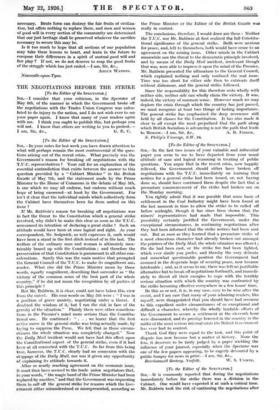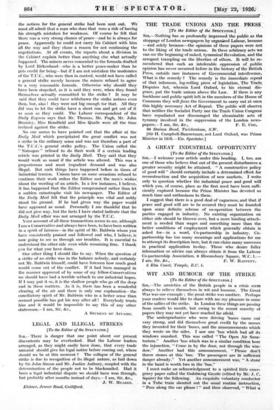[To the Editor of the SPECTATOR.]
Sts,—It is commonly reported that during the negotiations immediately before the strike there was a division in the Cabinet. One would have expected it at such a critical time. Mi.. Baldwin took the risk of continuing the negotiations after
the notices for the general strike had been sent out. We must all admit that a man who does that runs a risk of having his strength mistaken for weakness Of course he felt that there was a very strong chance of peace—and he is always for peace. Apparently he could not carry his Cabinet with him all the 'way and they chose a reason for not continuing the negotiations. At all events, the reports about a division in the Cabinet explain better than anything else what actually • happened. The miners never consented to the formula drafted by Lord Birkenhead—who is a better peace-maker than he gets credit for being—but if I am not mistaken the moderates of the T.U.C., who were then in control, would not have called a general strike merely because the miners refused to agree to a very reasonable formula. Otherwise why should they have been stupefied, as it is said they were, when they found themselves actually committed to the strike ? It may be
said that they could have withdrawn the strike notices even then, but, alas ! they were not big enough for that. All they did was to let the strike have a short run and get out of it as soon as they could. The Labour correspondent of .the Daily Express says that Mr. Thomas, Mr. Pugh, Mr. John Bromley, Miss Bondfield and Miss Quaile were all the time inclined against the strike.
No one seems to have pointed out that the affair at the
Daily Mail which precipitated the great conflict was not a strike in the ordinary sense and was not therefore a part of the T.U.C.'s general strike policy. The Union called the " Natsopas " refused to do their work if a certain leading article was printed in the Daily Mail. They said that they , would work as usual if the article was altered. This was a preposterous and most impudent demand and was also illegal. But such things have happened before in times of industrial tension. Unions have on some occasions refused to continue their work unless the Editor met the men's wishes' about the wording of an article. In a few instances, I believe, it has happened that the Editor compromised rather than let a sudden catastrophe visit his newspaper. The Editor of the Daily Mail felt that the principle was vital and nobly stood his ground. If he had given way the paper would have appeared as usual. Personally I am thankful that he did not give way, but the facts I have stated indicate that the Daily Mail affair was not arranged by the T.U.C.
Your account of all these transactions seems to me, although.
I am a Conservative and always have been, to have been written in a spirit of fairness—in the spirit of Mr. Baldwin whom you have consistently praised and followed and who, I believe, is now going to see us through our troubles. It is essential to understand the other side even while remaining firm. I thank you for what you have done.
One other thing I should like to say. When the question of
a strike of no strike was in the balance nobody, and certainly not Mr. Baldwin himself, could have foreseen how much good' would come out of the conflict. If it had been managed in the manner approved of by some of my fellow-Conservatives we should have had a terrible setback to our industrial hopes. If I may put it so, it is the shallow people who go off the deep end in these matters. As it is, there has been a wonderful clearing of the air and there is only one explanation—the conciliatory spirit of Mr. Baldwin who in a better sense than seemed possible has got his way after all ! Everybody trusts him and it would be impossible to say this of any other statesman.—I am, Sir, &c., A STUDENT OF AFFAIRS.















































 Previous page
Previous page